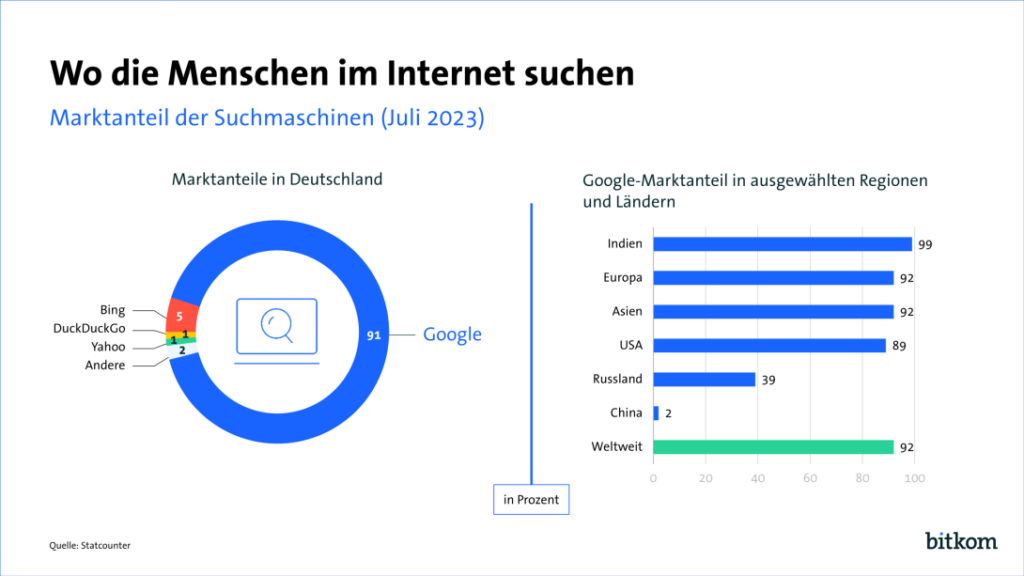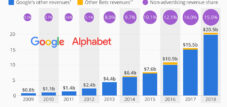Subject to the Internet search to less than 90% - Google reacts: "We stand in the threshold of a new era of search technology"
Language selection 📢
Published on: January 15, 2025 / Update from: January 15, 2025 - Author: Konrad Wolfenstein

Market share in the Internet search to less than 90% - Google reacts: “We stand in the threshold of a new era of search technology” - Image: Xpert.digital
Market shares in flux in brief: First cracks in Google's search engine dominance
Below 90%: Google's historical dominance is beginning to waver
Google's long-standing dominance of the search engine market is showing signs of erosion for the first time in over a decade. According to recent statistics from Statcounter, Google's global internet search market share fell steadily in the last three months of 2024, falling below 90 percent for the first time since 2015.
In December 2024, Google's market share was 89.73%, down from 89.34% in October and 89.99% in November. This decline, although moderate, marks a historic change. As of July 2023, Google still had a global market share of 92%, with the share in Germany being an impressive 91%. Despite this slight downturn, Google remains the market leader by a considerable margin, but there are increasing signs of growing competition.
The next largest competitor, Microsoft's Bing, recorded a market share of 3.97% in December 2024. Other search engines such as Yandex with 2.56%, Yahoo with 1.29% and DuckDuckGo with 0.66% follow far behind. However, industry dynamics suggest that Google's once unassailable position is increasingly being challenged.
Suitable for:
- Blog: AIS Artificial Intelligence Search / KIS – AI search / NEO SEO = NSEO (Next-gen Search Engine Optimization)
- Generative AI Optimization (GAIO) – The next generation of search engine optimization – from SEO to NSEO (Next Generation SEO)
Reasons for the decline
Several factors contribute to this remarkable change. Some of the key developments that have influenced the decline in Google's market share include:
1. Rise of AI-powered platforms
Artificial intelligence is revolutionizing the way information is searched and consumed. Platforms like ChatGPT and Perplexity offer users alternative ways to obtain information that are less dependent on traditional search engines. These AI systems are able to answer complex questions directly, eliminating the need for a classic search query.
Suitable for:
2. Amazon as a product search engine
Amazon has become a major player in product searches in recent years. More and more consumers are starting their search for products directly on Amazon instead of using Google. This trend has noticeably weakened Google's lucrative product search market.
3. TikTok as a source of information
TikTok has taken on a notable role as a platform for information search, particularly among younger users. Short, visual content captures the attention of Generation Z and displaces traditional search patterns. According to a survey, over 40% of young adults already use TikTok for recommendations, instructions and trends.
4. Increasing popularity of privacy-focused search engines
Search engines like DuckDuckGo that prioritize privacy are becoming increasingly important. At a time when data protection and privacy are becoming increasingly important, users are considering such alternative platforms to protect their personal information.
Regional differences
A closer look at the regional data shows that the decline in Google's market share is not uniform. The change is particularly noticeable in the United States. Here, Google's market share fell to 87.39% in December 2024, after it was 90.37% in November. Despite this development, Google remains the undisputed market leader in the mobile sector with a share of 93.88%.
In Europe, Google also remains dominant, but faces slowly growing competition from regional providers such as Qwant in France or Ecosia in Germany. In Russia, Yandex continues to successfully defend its home market with a share of 59%, while Google only achieves around 38% here.
Google's response to competition
Google has already started a number of strategies to respond to the changes in the market environment. Sundar Pichai, CEO of Alphabet, stated in late 2024: “We are on the cusp of a new era in search technology. Our job is to lead this development.”
Some of the key measures that Google is planning or already implementing include:
1. AI-powered search capabilities
Google is investing heavily in integrating AI into its search engine. With the help of technologies like Bard, Google's own AI model, search queries should not only be answered faster, but also more relevantly. The goal is to provide users with the most accurate information in real time and to handle more complex questions.
Suitable for:
2. Focus on visual and interactive content
Given the growing importance of platforms like TikTok, Google is working on new search formats that prioritize visual and interactive content. These approaches aim to appeal to a younger audience while competing with social media.
3. Expansion of the Google Shopping offering
In order to counteract the competitive pressure from Amazon, Google has significantly expanded its shopping platform. The company is trying to get more users to search for products on Google with personalized product recommendations, improved price comparison tools and AI-powered shopping assistants.
4. Data protection initiatives
Google is taking steps to improve its privacy image. With features such as the ability to anonymize search queries and clearer transparency policies, the company aims to allay user concerns and build trust.
Long term outlook
Although Google continues to maintain its position as market leader, developments show that no company remains untouchable in the long term. Competition in the search engine market is becoming more intense, and new technologies could further challenge the status quo. The next few years will be crucial to whether Google can maintain its lead.
An important indicator will be the acceptance of Google's AI initiatives. If the company manages to maintain its technological edge while addressing the needs of its users, the current decline could prove temporary. If not, new players or alternative platforms could gain increasing market share.
Developments in the search engine market are not only a reflection of technological progress, but also an indication of how users' priorities are changing. While speed and accuracy were once the focus, data protection, personalization and the integration of AI are now playing an increasingly important role. Google has recognized these trends and is working hard to adapt. However, the question remains whether these measures will be sufficient to overcome the challenges of the next few years.
It is eagerly awaited which innovations Google will present in 2025. As Sundar Pichai pointed out, “deep changes” are planned that aim to fundamentally transform the search experience. It remains to be seen whether these innovations will be enough to secure Google's dominance in the long term or whether we are at the beginning of a larger paradigm shift.
Our recommendation: 🌍 Limitless reach 🔗 Networked 🌐 Multilingual 💪 Strong sales: 💡 Authentic with strategy 🚀 Innovation meets 🧠 Intuition
At a time when a company's digital presence determines its success, the challenge is how to make this presence authentic, individual and far-reaching. Xpert.Digital offers an innovative solution that positions itself as an intersection between an industry hub, a blog and a brand ambassador. It combines the advantages of communication and sales channels in a single platform and enables publication in 18 different languages. The cooperation with partner portals and the possibility of publishing articles on Google News and a press distribution list with around 8,000 journalists and readers maximize the reach and visibility of the content. This represents an essential factor in external sales & marketing (SMarketing).
More about it here:
Google's unchallenged lead is shaking: A detailed look at the latest numbers
The Erosion of Search Engine Supremacy: Google's Challenges and the Future of Information Search

As recently as July 2023, Google was able to claim a market share of an impressive 92% worldwide and even 91% in Germany - Image: Bitkom
For the first time in a long time, Google's undisputed dominance in Internet search, which was considered almost unshakeable for over a decade, is showing signs of cracking. Recent statistics from the renowned analysis service Statcounter indicate that Google's global market share in the search engine segment fell below the symbolic 90 percent mark for the first time in the last three months of 2024.
The concrete figures prove this trend: In December 2024, Google's market share was 89.73%, after it was 89.34% in October and 89.99% in November. This development marks the first continuous three-month period since spring 2015 in which Google consistently recorded a market share of less than 90%. For comparison: As recently as July 2023, Google was able to claim a market share of an impressive 92% worldwide and even 91% in Germany. This slight but significant decline has made observers sit up and take notice, raising questions about the underlying causes and possible future developments.
Despite this observed trend toward erosion of its dominance, Google remains the clear market leader in Internet search by a comfortable margin. The immediate pursuer, Microsoft's search engine Bing, achieved a market share of 3.97% in December 2024. Other competitors such as the Russian search engine Yandex with 2.56%, Yahoo with 1.29% and the data protection-focused provider DuckDuckGo with 0.66% follow at a considerable distance and currently play a rather minor role in the overall global picture. The numbers show that Google continues to have an immense reach and user base, but the slight shift in market share could be a harbinger of deeper changes in the search market.
The complex reasons for the slight decline
The reasons for this observed decline in Google's market share are complex and reflect the dynamic development of the Internet and changing user needs. Several factors appear to be interrelated and contribute to this development:
1. The rise of intelligent competition
AI-based platforms are coming to the fore: One of the most significant developments challenging Google's dominance is increased competition from artificial intelligence (AI)-based platforms. Services like ChatGPT and Perplexity AI have gained tremendous attention in recent years, offering users an alternative way to search and process information. Unlike traditional search engines that present a list of relevant websites, these AI-based platforms often provide direct answers to complex questions in the form of summary text or structured information. This approach particularly appeals to users who want to access concise information quickly and efficiently without having to click through a multitude of search results. The ability of these platforms to interact conversationally with users and answer follow-up questions represents a new way of searching for information that could potentially fundamentally change user behavior.
Suitable for:
2. Amazon as the primary destination for product searches
Another important factor affecting Google's search volume is Amazon's growing market share in product searches. For many users, Amazon is now the first port of call when they want to search for products, compare prices or read product reviews. Instead of using a general search engine first, they navigate directly to the Amazon platform, which offers a comprehensive range of products and detailed information. This trend is particularly pronounced in the e-commerce sector and means that a significant proportion of search queries that used to go through Google now take place directly on Amazon. Amazon's specialization in product information and direct access to the purchasing process make the platform more attractive for many users in this area than a general search engine.
3. TikTok and the change in how young generations obtain information
A notable development that primarily shapes the search behavior of younger user groups is the increasing use of platforms such as TikTok to search for information. Generation Z and younger target groups in particular use TikTok not only for entertainment, but also to find out about current trends, products, travel destinations or even news. The short, visually engaging videos on TikTok provide an accessible and entertaining way to absorb information. This trend represents a significant shift in the way young people search and consume information and could impact the search volume of traditional search engines in the long term. The informal and authentic nature of much TikTok content, coupled with the platform's algorithmic personalization, makes it an attractive alternative to traditional web searches for many young users.
4. Growing awareness of data protection and privacy
In recent years, Internet users' awareness of data protection and privacy has increased significantly. This could lead some users to consciously choose alternative search engines that place a greater focus on protecting personal data, such as DuckDuckGo. Although the market share of such privacy-oriented search engines is still relatively small, the growing awareness of this issue could contribute to further fragmentation of the search engine market in the future.
5. Specialized search engines and niche providers
In addition to the big players, there are a variety of specialized search engines and niche providers that focus on specific subject areas or industries. These search engines often provide more accurate and relevant results for users seeking specific information. Examples of this are search engines for scientific publications, legal databases or travel search engines. The existence and use of such specialized offerings also help to slightly reduce the search volume of general search engines, including Google.
6. Direct navigation and app usage
Another factor influencing search behavior is the increasing tendency of users to navigate directly to well-known websites or apps instead of using a search engine. For example, when users access the website of their favorite news agency or the app of an online shop directly, they bypass the search engine. This development is particularly relevant in the mobile sector, where apps play a central role in everyday user life.
Regional differences in the search engine market
The development of the search engine market is not homogeneous, but shows clear regional differences. In the United States, for example, Google's market share fell to 87.39% in December 2024, down from 90.37% in November. This development in one of the most important and technologically advanced markets in the world is particularly remarkable.
In mobile, which accounts for an increasingly larger share of internet traffic, Google remains extremely dominant with an impressive 93.88% market share. These numbers make it clear that Google continues to enjoy clear user preference, especially on mobile devices. The integration of Google services into the Android operating system and the widespread use of the Google app contribute significantly to this dominance.
It is important to emphasize that search engine market shares can vary greatly depending on the region. In some countries, local search engines have a stronger position, for example Yandex in Russia or Baidu in China. Preference for certain operating systems and mobile devices can also influence search behavior and the use of various search engines. A detailed analysis of regional differences is therefore essential to obtain a comprehensive picture of the global search engine market.
Google's response and future strategies
Despite the slight decline in its market share, Google maintains its undisputed dominant position and is aware of the challenges and changes in the search engine market. The company continues to invest intensively in the further development of its search functions and is increasingly relying on artificial intelligence.
Google CEO Sundar Pichai already announced the search engine for the year 2025. These planned innovations should enable users to answer even more complex questions than before and to get the desired information even more intuitively and efficiently. It is expected that Google will increasingly integrate generative AI models into its search results in order to offer users summarizing answers and various perspectives on one topic. In addition, Google is working on improving the personalization of search results and the integration of visual and language -based search methods.
The continuous development of search technology and adaptation to changing user needs are crucial for Google to secure its leading position in the search engine market in the long term. The company faces the challenge of balancing the advantages of its established search engine with the innovative possibilities of new technologies such as AI.
Suitable for:
Historical context and the evolution of search
In order to better understand the current situation in the search engine market, it is informative to take a look at the historical development of Internet searches. In the early days of the Internet, there were a variety of search services and web directories competing for users' attention. Search engines like AltaVista, Yahoo! and Lycos were popular in the 1990s before Google entered the scene in the late 1990s with an innovative algorithm called PageRank.
PageRank revolutionized the way search engines rated and ranked websites, allowing Google to deliver significantly more relevant and higher quality search results than its competitors. This technological edge, coupled with a user-friendly interface, contributed significantly to Google's rapid rise to become the dominant search engine. Over the years, Google has continually improved its search algorithms and expanded its functionality, including by integrating image search, video search, mapping services and news.
The history of internet search is marked by technological upheavals and the rise and fall of various players. The current development, in which AI-based platforms and specialized search offerings are gaining importance, could represent a new turning point in this story.
The Future of Information Search: A Look Ahead
The slight erosion of Google's market share could be an indication that the search engine market is in a phase of change. It remains to be seen whether the observed decline will prove to be a temporary trend or the start of a long-term development. Several factors suggest that competition in the search engine market will increase in the coming years.
The continued development of artificial intelligence will undoubtedly play a crucial role in shaping the future of information search. AI-based platforms are expected to become increasingly sophisticated and user-friendly, posing serious competition to traditional search engines. The way users search and consume information is also expected to evolve, with visual and voice-based search methods potentially becoming more important.
Whether Google can maintain its dominant position in the search engine market in the long term depends largely on its ability to adapt to these changes and continue to offer innovative technologies and services that meet users' needs. The coming years will show whether the slight decline in Google's market share was a wake-up call for the company and whether it will be able to defend its dominance in an increasingly dynamic and competitive market. The diversity of information sources and search methods available could ultimately benefit users and lead to more efficient and personalized information retrieval.
We are there for you - advice - planning - implementation - project management
☑️ SME support in strategy, consulting, planning and implementation
☑️ Creation or realignment of the digital strategy and digitalization
☑️ Expansion and optimization of international sales processes
☑️ Global & Digital B2B trading platforms
☑️ Pioneer Business Development
I would be happy to serve as your personal advisor.
You can contact me by filling out the contact form below or simply call me on +49 89 89 674 804 (Munich) .
I'm looking forward to our joint project.
Xpert.Digital - Konrad Wolfenstein
Xpert.Digital is a hub for industry with a focus on digitalization, mechanical engineering, logistics/intralogistics and photovoltaics.
With our 360° business development solution, we support well-known companies from new business to after sales.
Market intelligence, smarketing, marketing automation, content development, PR, mail campaigns, personalized social media and lead nurturing are part of our digital tools.
You can find out more at: www.xpert.digital - www.xpert.solar - www.xpert.plus


























